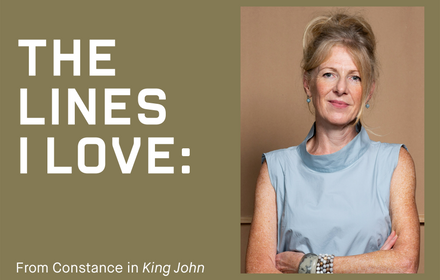
General
The Lines I Love Part 1
7 May 2025

'We few, we happy few, we band of brothers' from Henry V

In our occasional series, we ask theatre insiders to pick a speech from Shakespeare they love and tell us why. In this part, Bell Shakespeare's Associate Director James Evans shares his choice with Andy McLean.
As the battle of Azincourt looms ahead of them, King Henry knows his exhausted army is riddled with doubt. Everyone knows they are outnumbered and outgunned. And there’s dissent among the ranks.
Yet somehow, Henry finds the words to unite and inspire everyone around him. His St Crispin’s Day speech rouses the English to achieve victory against all the odds. It’s an incredible act of imagination and leadership, according to James Evans:
“Henry starts by acknowledging the soldiers’ fears, saying ‘If we are marked to die’ upfront. This shows them that he sees and shares their concerns. Then he paints a vivid picture in their minds of the future—how one day they’ll each tell their grandchildren and neighbours about the battle and how their scars will be badges of honour. He even suggests the soldiers will achieve a kind of immortality, because their feats will always be remembered.
“Shakespeare has a lot to say about leadership, and specifically about how you perform leadership—how you stand up in front of a group and deliver a message; how you use all the charisma at your disposal to galvanise everyone and get them on side. That's one of the many reasons I love this speech.”
Here is Henry's speech in full, from Act 4 Scene 3:
If we are marked to die, we are enough
To do our country loss; and if to live,
The fewer men, the greater share of honour.
God’s will, I pray thee wish not one man more.
By Jove, I am not covetous for gold,
Nor care I who doth feed upon my cost;
It yearns me not if men my garments wear;
Such outward things dwell not in my desires.
But if it be a sin to covet honour,
I am the most offending soul alive.
No, ‘faith, my coz, wish not a man from England.
God’s peace, I would not lose so great an honour
As one man more, methinks, would share from me
For the best hope I have. O, do not wish one more!
Rather proclaim it, Westmoreland, through my host,
That he which hath no stomach to this fight,
Let him depart. His passport shall be made,
And crowns for convoy put into his purse.
We would not die in that man’s company
That fears his fellowship to die with us.
This day is called the feast of Crispian.
He that outlives this day and comes safe home,
Will stand a-tiptoe when the day is named
And rouse him at the name of Crispian.
He that shall live this day, and see old age,
Will yearly on the vigil feast his neighbours
And say, ‘Tomorrow is Saint Crispian.’
Then will he strip his sleeve and show his scars.
And say, ‘These wounds I had on Crispin’s day.’
Old men forget; yet all shall be forgot,
But he’ll remember with advantages
What feats he did that day. Then shall our names,
Familiar in his mouth as household words
Harry the King, Bedford and Exeter,
Warwick and Talbot, Salisbury and Gloucester,
Be in their flowing cups freshly remembered.
This story shall the good man teach his son,
And Crispin Crispian shall ne’er go by,
From this day to the ending of the world,
But we in it shall be remembered –
We few, we happy few, we band of brothers;
For he today that sheds his blood with me
Shall be my brother; be he ne’er so vile,
This day shall gentle his condition;
And gentlemen in England now abed
Shall think themselves accursed they were not here,
And hold their manhoods cheap whiles any speaks
That fought with us upon Saint Crispin’s day.
Bell Shakespeare is staging Henry 5 at Arts Centre Melbourne from 11 to 25 May.